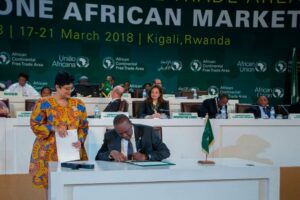
Learning from the Past: Addressing Challenges and Pitfalls to Ensure the Success of the AfCFTA
At the time of its ratification in 2004, the East African Community (EAC) free trade agreement was expected to enhance increased intra-regional trade in the region. The agreement was expected to accelerate trade liberalization, promote production efficiency and enhance domestic, cross-border, foreign investment, and promote economic development and industrial diversification in the region. Years later, trade between the partner states within the region was partly 20% in 2022 lower than the expectations of leaders at the time of the launch. Member states are trading more with countries outside the block than partner states and are thus net importers of products and services that would ideally be sourced within the region. This is the same situation within other trading blocs across Africa including COMESA, SADC, ECOWAS, and IGAD among others presenting significant lessons in the implementation of the African Continental Free Trade Area (AfCFTA) Agreement.
The AfCFTA, the world’s largest free trade area agreement bringing together 55 countries of the African Union and 8 Regional Economic Communities is expected to create a single continental market of about 1.3 billion people and a combined GDP of US$3.4 trillion. The free trade area agreement thus holds immense potential in revolutionizing intra-trade and unlocking unprecedented economic opportunities for the continent. However, having witnessed failures of past free trade pacts in the continent, there is a need for African nations to avoid the challenges and pitfalls of the past in the implementation of the new continental pact. By learning from the failures of the past, the AfCFTA can proactively address critical issues that have led to the failures of past trade agreements.
Past trade agreements have suffered from signatory nations adopting different tariff lines and other protectionist policies which breach the original agreements driving failures. African regional trade block has suffered from the persistence of non-tariff barriers (NTBs) despite the frameworks being grounded on the need to reduce or eliminate them entirely. The AfCFTA seeks to deal with NTBs such as excessive regulations, custom delays, and cumbersome administrative procedures which hinder smooth trade flows and negate the benefits of preferential tariff arrangements. Thus, there AfCFTA implementation must address non-tariff barriers by focusing on increased comprehensive harmonization effects, streamlining customer procedures, and creating mechanisms for effectively monitoring and resolving trade barriers effectively.
Infrastructure gaps and connectivity issues have also limited the implementation of regional trade blocs with the continent lacking an adequately linked air transport system, a railway system to move its merchandise, and problematic sea links. In addition to the insufficient transportation networks, limited energy access, and inadequate digital connectivity continue to impede the effective movement of goods, services, labor, and information across the continent. It is therefore lost on AfCFTA member states on the need to prioritize infrastructure development initiatives to rise above the challenges that regional blocs have had to contend with. Africa must therefore prioritize infrastructure development initiatives on transportation corridors, and energy networks, and enhance digital connectivity to bridge these gaps and enhance trade facilitations for the effective implementation of the AfCFTA.
Africa’s free area trade blocs have had to grapple with coordination and implementation challenges that keep recurring across the markets. Nations not subscribed to the AfCFTA had had to prioritize national interests to the detriment of the regional agreements thus slowing any tangible benefits for individual member states. The implementation of agreed-upon provisions has faced challenges from complexities in the national regulatory frameworks, weak institutional capacities, and limited resources that have continuously recurred within the continent. The AfCFTA thus comes against the backdrop of unwillingness or the ability of member states to rise among selfish interests and politics and work towards the benefit of the African people. Thus, the challenge is on the AfCFTA secretariat and member states to willingly and collaborative establish robust coordination mechanisms and frameworks, enhance institutional capacities, and provide adequate resources to ensure timely and effective implementation of trade commitments across the continent.
There has been a failure in enhancing inclusive participation and capacity building in the implementation of free trade blocs in the past across Africa. in the implementation of the AfCFTA therefore, inclusive participation, including in negotiations, for all African countries and economies however small is critical in enhancing the success of the investment protocol. In the past, trade agreements have often struggled to include all member states with larger economies such as South Africa, Kenya, and Nigeria bullying smaller economies thus leading to disparities in accrued benefits and limited overall participation. The AfCFTA implementation, therefore, needs to invest in capacity-building programs, technical assistance, and the support of less-developed economies to support their abilities to effectively participate in its implementation and benefit from the trade integration efforts. In essence, driving increased inclusivity will allow the AfCFTA to benefit from all African countries’ contributions and equally benefit more equitably.
Political will and commitment gaps from members state have equally weakened the implementation of previous trade agreements within the continent. Past experiences have shown that inconsistent political support and wavering commitment tend to undermine the progress the regional trade agreements and the AfCFTA will be no exception of the failures are unchecked. The challenge for implementers is to foster a string commitment among African leaders through continued advocacy, awareness campaigns and showcasing the potential benefits of the trade area. For instance, open dialogue and regular consultations among members can help in sustaining the political momentum and ensure the increased long-term success of the AfCFTA.
The private sector remains an indispensable stakeholder in the successful implementation of free trade area agreements. The active involvement of the private sector and relevant stakeholders is necessary for the AfCFTA to realize its promise. Previous trade agreements have been slow in incorporating the voice of the private sector in decision-making processes and consultation forums. There is therefore a need for the AfCFTA implementation to be grounded on the involvement of businesses, industry associations, and civil society. This can be in policy discussions, the implementation process, monitoring mechanisms, and overall decision-making. This face of engagements can enhance ownership of the trade agreement and its processes, enhance the relevance of trade provisions, and deepen stakeholder commitment towards the success of the free trade area.
Ultimately, the AfCFTA needs to embrace effective monitoring and evaluation mechanism and processes in tracking the progress and the impact of the implementation process. In the past, it has been challenging or trade agreements in assessing the outcomes and identifying areas of improvement due to the lack of comprehensive and effective monitoring mechanism. Incorporating this mechanism for the measurement and tracking of socio-economic impacts, trade flows, job creation, and investment creations trends is therefore necessary. Done in a regular and transparent manner, thus will enhance the capacity of member states to easily identify gaps and address challenges proactively.
With a comprehensive and proactive approach, the AfCFTA can pave the way for a new era of intra-African trade and position Africa as a global economic powerhouse. The continent’s collective efforts and commitment to overcoming these challenges will be crucial in harnessing the full potential of the AfCFTA for the benefit of all African nations.
These are the writer’s own opinions and do not necessarily reflect the viewpoints of Liberty Sparks. Do you want to publish in this space? Contact our editors at info@libertysparks.org for further clarification.



